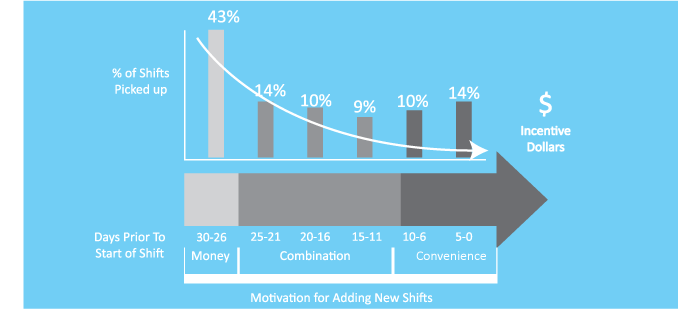Last-minute incentives don’t work. It’s a bad habit that many hospitals and health systems have enabled for far too long. And nurses have learned to play the game. It makes sense: why would a nurse sign up for an open shift early if they know a higher incentive will be offered closer to the start of the shift? Even though this frustrates nurse leaders and threatens to blow their budget each pay period, they enable the behavior by continuing the process.
Many nurse leaders wonder what can they do? They feel their hands are tied because they need to fill the need and offering high incentives is what gets people to sign up for shifts. But filling open shifts doesn’t have to be this way. Nurse leaders have the ability to stomp out the unfair and costly process of offering premium pay for last-minute open shifts. At the root of poor open shift practices is the failure to take into account what actually motivates staff to pick up open shifts.
Avantas performed a study at two large hospital systems to examine perceived motivation versus manifest motivation in filling high-need nursing shifts and how a scheduling module of decreasing financial incentives as shift dates approached supported nurses’ decisions. The study illustrated two findings: 1) incentives calculated by degree of need in advance of the shift are more efficient than high-dollar last-minute incentives; and 2) individuals’ perceptions of what motivates them in selecting a shift and how those motives manifest in reality are often contradictory. In other words, individuals stating financial incentives were the primary motivator in shift selection demonstrated that their shift selections had as much if not more to do with how that shift fit into their schedule.
This second finding, regarding perceived versus actual motivation, points to the reason why reactive, last-minute incentives offered to fill open shifts are essentially wasted dollars and can result in program abuse (i.e., 11th hour bartering), inefficiency, perceptions of favoritism, spiraling costs, and a sense of entitlement among nursing staff. This sense of entitlement refers to the expectation developed over time that all additional shifts picked up should be tied to the highest incentives. This mindset often leads to a stalemate that fails to fill the shift, decreases morale, and creates lasting tension between managers and staff.
So what’s the solution? Scheduling software powered by predictive analytics to forecast staffing needs in advance sets the stage for an effective open shift program that rewards staff for picking up shifts several weeks in advance. Once all staff members are scheduled to their commitments, open shifts are automatically posted to individuals approved to pick up the shifts, based on their certifications and skills profile. Staffing needs change as volume projections rise and fall and more shifts become available or are picked up.

Incentives can be offered through the open shift program and aligned with budgeted bonus targets that correspond to the severity of the need. This means that incentives would peak at 30 days before the shift, then decline in terms of dollars as shifts are picked up and the date of the shift approaches. This proactive approach to filling open needs rewards staff for picking up shifts well in advance, thereby solidifying staffing plans sooner while offering a lifestyle incentive calculated to meet the needs of a flexible schedule.
Now is the time to put an end to poor open shift practices that are costly for the organization and makes waves in staff morale. Implementing fair staffing practices and aligning incentives with a proactive approach to filling shifts has a positive impact on budget and staff satisfaction.
Read more about our research on open shift management and understanding staff motivations.
Learn more about our Open Shift Management platform.


